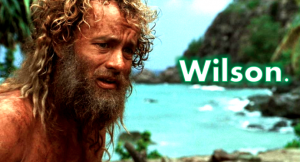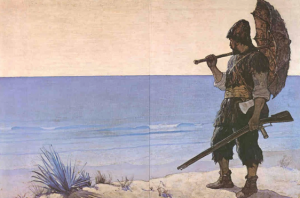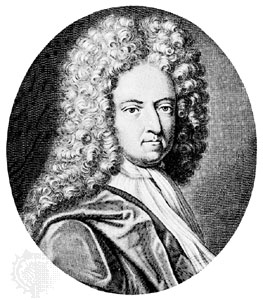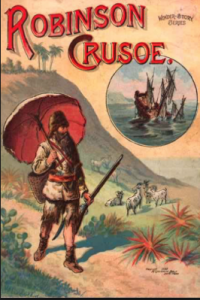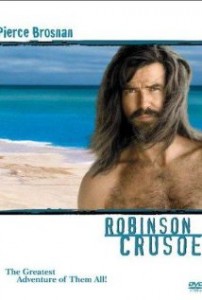By Monica Pastor
Robinson Crusoe has managed to emerge as a 21st century household name, transcending multiple mediums and time periods. It’s inspired 18th century sequels, a crazy bearded Tom Hanks and the foolish characters on Gilligan’s Island. Why did this work establish such a timeless legacy and go on to be one of the most widely published books in history and not poor Roxana? Robinson Crusoe is a captivating adventure novel, filled with action-packed shipwrecks, famished cannibals and ruthless mutineers. György Lukács does not view this entertaining quality of the novel admirably and rather, sees it creating caricatures and narrowing the reality of the content. But Defoe’s realistic fiction shares more traits with the empirical epic than Lukacs might think. While it is impossible to cram an absolutely perfect snapshot of the transformational, modernizing 18th century England into a hundreds of pages, this novel runs somewhat parallel to the dramatic shifts in Defoe’s era. The straightforward narration style, action-driven plot and Crusoe’s religious/moral contradictions present the narrative objectively, establishing Crusoe as an unbiased pair of eyes. He gets close to filling the shoes of a modern day Homer. Is that what has enabled Robinson Crusoe to be recycled through multiple mediums and re-introduced into 21st century discussion? Is it a combination of borrowing from the epic’s objectivity and the novel’s universal lessons on human nature ? Or does Lukács win and Robinson Crusoe is just a dang good piece of entertainment?
It looks like the classic, adventure novel. One man must overcome overwhelming obstacles of hurricanes, starvation, isolation and other phenomena seen in today’s grittiest of action movies. Robinson Crusoe experiences psychological torment from all these physical obstacles as well, as he constantly re-discovers himself and his limits. Defoe places his narrative in the hands of Robinson Crusoe, an Englishman born into a family of German immigrants in the late 17th century. Crusoe, a young, ambitious man, abandons his family from Chapter 1 to pursue his dream of exploration and sets out to sea. Once Crusoe sets off from London, the tales of fortunes and misfortunes begins. Pirates seize Crusoe’s ship. The young explorer is enslaved to a potentate in the North African town. He escapes. He briefly becomes a plantation owner in West Africa and sets sail for a new expedition to find slaves. His luck turns bad once again when Crusoe ends up shipwrecked off the coast of Trinidad and is abandoned on an island alone. He spends 28 years on this remote tropical land, encountering cannibals, captives and mutineers before being rescued. When he returns to the mainland, Crusoe discovers that his plantation made a great deal of profit and he becomes a wealthy man, eventually marrying a woman who remains nameless.
Creations like Cast Away and Treasure Island have followed its action driven plot. Lukács does not view this page-turning quality of the novel in such high regard as dedicated sequel-writers of Robinson Crusoe did. The Hungarian Marxist philosopher believes this “superficial likeness can almost lead the caricature being mistaken for the real thing” (Lukács, 73). He believes the characters in the novel are satirical and immaterial, straying too far away from real people in real time. But Defoe lived in a time where depicting “the real thing” or the real world was much harder than in Homer’s time of epic writing. The epic can creates an accurate snapshot of its Greek society because it was a simpler time. Society was less developed with many ideas left unexplored, from gender roles to efficient trading routes. For the novel that exists in multidimensional societies and intricate systems, it is impossible to capture these complexities in all its totality. Lukács claims the “epic, being life itself” could capture the elements and essence of the corresponding real world (Lukacs, 74). Whether he was aware of it or not, Defoe comes close to encapsulating the real world in his modern-day epic using several literary and thematic tactics.
The danger in any writer’s attempt to capture this totality is that “instead of an existent totality, only a subjective aspect of that totality will be given form, obscuring or even destroying the creative intention of acceptance and objective which the great epic demands.” (Lukacs, 73) This subjective and narrow-minded outlook on the world is only presented by the caricatures in Lukács’ versions of the novel. But Crusoe starts his story off through the unbiased lens of his unsentimental protagonist.
Starting in the preface, an unnamed editor mentions Robinson’s story without using his name explicitly but says the narrative describes a “private man’s adventure in the world,” and advises the reader to focus on the novel’s realism and take its “history of fact” into account (Defoe, 6). Going into Crusoe’s adventures with the editor’s recommendation in mind allows the reader to read Crusoe as a representation of something larger than his individual character. The opening words of Chapter 1 are almost identical to Roxana’s being incredibly fact-oriented and straight forward. We see Crusoe’s unsentimental and practical mind that will carry him throughout his ordeal in the opening line, stating his birthplace, year and family status. He exhibits no emotional attachment to his origin of residence and continues to explain the timeline that his journey will follow. Crusoe describes his European world factually, eliminating all impressions and room for subjectivity. The novel is very action-driven, where pages upon pages are used to properly explain the logistics of Crusoe’s shelter building and herding of sheep.
The lack of emotional attachment, an inhumane characteristic, tends to distance the reader and a barrier between the audience and the protagonist. But Crusoe speaks directly to the readers, addressing us like we are his trusted friends. We are invited into his world, unlike the exclusivity of Renaissance elitist poems (Surrey, Wyatt). Crusoe’s open-dialogue validates him as a credible, trustworthy narrator and adds a sense of real intimacy to his story.
The objectivity in the opening lines runs parallel with Lukács definition of the great empirical epic. Crusoe’s open dialogue also runs parallel with the oral story-telling methods of the original epics. Odysseus’ journey of Cyclopes and muses infamously spread by word of mouth and not by the printing press. Even though the world of print erased this oral story-telling trend, Defoe creates this oratory feeling through Crusoe’s direct dialogue. Her dialogue rarely contains periods and her trains of thought are erratic, divided by semicolons and commas. Crusoe’s straightforward sentence structure enables us to digest the reality of his world in a well-structured manner, much more well-structured than Roxana’s rambling rants.
Once Crusoe earns the reader’s trust so early in the novel, Defoe steps in. Defoe makes Crusoe a self-contradictory character, flip-flopping between religious and moral beliefs the second he arrives on the island. This conflicting nature of Crusoe translates into the major shifts in Defoe’s 18th century England. The novel was published in 1719, following decades of wars and dramatic changes in the monarchy. There was the English Civil War, the Nine Years’ War and the birth of the United Kingdom of Great Britain in 1707. The Commonwealth of England and the Protectorate eventually replaced the English monarchy. The monopoly of the Church of England on Christian worship came to an end and the victors consolidated the already-established Protestant Ascendancy in Ireland. So England existed in a radical age of modernity, far more transformational than the static period of Homer’s Odyssey.
The novel is basically chapters of physical and moral transitions. Crusoe moves from the thrilling ship as the confident, daredevil to the dismal island, alone and bewildered. He shifts from hopeful explorer to hopeless castaway. Upon arriving at the island, Crusoe is oblivious as to how to care of himself in this unknown place. But soon he learns the complex process of flour grinding and bread making, creates a mini-sheep colony and has complete ownership of the island in his eyes. He transitions into the role of powerful landowner, experiencing the world as both an inferior and superior, referring to his shelter as the “castle” and he the King (Defoe, 340).
Besides his multiple changing roles, Crusoe experiences personal transitions between values and beliefs. After several years on the island, Crusoe realizes he craves human connection after such a long period of isolation, “I thought I lived very happily in all things, except that of society” (Crusoe, 335). Even after this realization, Crusoe stumbles upon footprints years later and retreats in fear. It starts to become difficult to decipher how Crusoe really feels about human connection. This lack of clarity reminds us again that Crusoe is a representation, illustrating the confusing sentiments surrounding Defoe’s society. He also represents the ambiguity that comes with being human. And he is fully aware of it, which is humbling and validate his non-biased accounts even more. But soon these contradictions spread onto Crusoe’s outlook on religion which is where Defoe’s loses in becoming the 18th century Homer.
It is well known that Defoe was a Puritan, writing religious pamphlets and The Family Instructor in 1715, a conduct manual on religious duty. Robinson Crusoe illustrates Defoe’s religious convictions but Crusoe’s immoralities and shifts in his faith pose a contradiction to the writer’s supposed devoted Protestantism, at first. Crusoe is introduced as an immoral character, disobeying his father and abandons his family for his own pursuits. He pushes Ismael (a slave) off of a boat and dedicates an entire voyage after an escape to finding slaves. When he arrives on the island, he despises it, repeatedly expressing his contempt for the situation and the world surrounding him. But as stated in the preface, Crusoe’s story is published to instruct others in God’s wisdom (Defoe, 6). A vital part of this wisdom is the importance of repenting one’s sins, something Crusoe experiences after conquering the island.
It appears at first that Crusoe is an immoral, ungrateful rebel, living by the beat of his own drum. But this incongruity between the moral author and sinful Crusoe is cleared up through Crusoe’s self-awareness and the resulting happy ending. He eventually refers to the disobedience of his father as his “original sin” and the “evil influence that carried [him] away” (Defoe, 50). Defoe lived centuries after the English Reformation, when the Church of England broke away from the authority of the Pope and the Catholic Church. In the 18th century, after so many shifts, Catholic revivals, Anglicanism and more sects of Christianity increased in numbers and power. Defoe’s attempt to use Crusoe somewhat as a religious doctrine is where Defoe’s agenda comes forward, risking the novel’s chances at being a modern day epic.
“The way Homer’s epics begin in the middle and do not finish at the end is a reflexion of the truly epic mentality’s total indifference to any form of architectural construction.” (Lukács, 67). Defoe is not “totally indifferent” to religion as we see Robinson Crusoe’s life in entirety, filled with ups and downs but which ends in somewhat of a happy ending as a result of his repentance. His wealth and eventual marriage after the island shows Crusoe as a “good guy”, which comes after re-discovering God. Defoe uses Crusoe to spread the Protestant word, like when he converts Friday, a Caribbean native to Protestantism under his tutelage. If Defoe had eliminated all religion in his text, then it wouldn’t be a representative piece of text of the 18th century. Shifting views in religion ran rampant in his age of modernity. But Crusoe did not have to convert others to send this message. Defoe could have omitted this scene or even Crusoe’s frequent grateful outcries to his lord. This favoritism of Protestantism in Robinson Crusoe disabled the reader at the time, and even today, to define their own understanding of religion. It also allows us to know the writer’s intention, weakening Crusoe’s accounts of objectivity.
“Today we love what tomorrow we hate, today we seek what tomorrow we shun, today we desire what tomorrow we fear, nay, even tremble at the apprehensions of” (Defoe, 174).
Defoe lived in an age of modernity and was fully aware of it. He was fully aware of the human’s ability to change and transform. He was fully aware of our self-contradictions, a tendency that any modern day viewer can relate to. Unfortunately, Defoe could not transform for this novel and let go of his binding Protestant ideals. He comes so close to proving Lukacs wrong. Robinson Crusoe is so close to filling a modern day Odysseus’ shoes. But Lukacs is the only one who cares. We don’t care about Crusoe’s Protestant favoritism since its something omitted from all modern day adaptations of the tale in our secular society. What we care about is the universality in Crusoe’s inability to fully grasp who he is. What we care about, especially in our fast-paced digital crazed age, is what will entertain us and have us sitting on the edge of our seats. This may come in the form of a bearded Tom Hanks shouting at a volleyball. This may come in the form of a bunch of fools aboard the SS Minnow. The epic’s ultimate principle presents “the world at any given moment”, and Robinson Crusoe does so to an impressive degree (Lukacs, 46). And at the same time, it has created one of the most entertaining and honest depictions of man’s indecisive nature of all time.
References:
Defoe, Daniel, and N. C. Wyeth. Robinson Crusoe. New York: Scribner, 1983. Print.
Lukács, György. The Theory of the Novel; a Historico-philosophical Essay on the Forms of Great Epic Literature. Cambridge, MA: M.I.T., 1971. Print.

